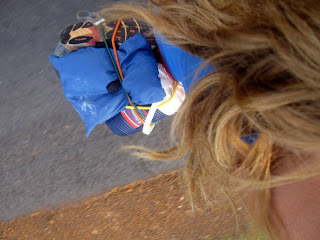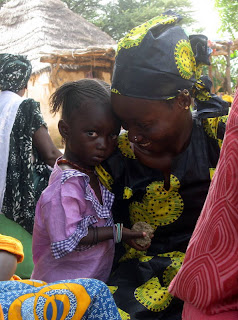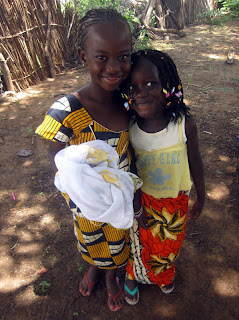For most of the past month, the answer has been "yes" . . . though unfortunately we're not talking about a beerrun. During the month of Ramadan, Senegalese people inquire whether or you are participating in the fast by asking if you are "in Ramadan," which is often shortened simply to "Are you in?" When I say that I am indeed "in," the favorite follow-up comment is to tell me that Ramadan has made me smaller and that I've lost my "jay fonday"(large round butt), to which I respond by standing up and sticking out my bum to show that it's still there. They disagree, but say: "Don't worry, after Ramadan, we'll eat lots of of fresh yogurt and drink lots of fresh milk, and your jay fonday will come right back." Honestly, this exact exchange has taken place more that a few times.
Then one night, it happened: one man peered over the compound wall to the West, and cried out to the rest of us. A crowd gathered to peer at the sky, and rejoiced as they saw the tiny sliver of a new moon rising on the dusky horizon. And just like that, Ramadan was over, just as it had begun, with a new moon and a call to prayer.
Needless to say, I'm relieved to have Ramadan done with. Fasting everyday started to wear on my mind and body; thirst is especially debilitating, and I realized that I've never really voluntarily resisted drinking water before. Everyone was feeling the effects of it, which was made abundantly clear in the general malaise and crankiness that settled over the village. And yes, I was cranky, too.
Now that things are back to normal, it's a lot easier to talk to about projects and engage my neighbors in getting things started. What kinds of things am I looking ahead to? I want to work on helping my village rehabilitate its non-functional health hut -- a long process that will start with reviving and convening the health committee in the village, figuring out how we'll motivate (i.e., pay) our two village health workers, and then looking for ways to get a hold of a nice health hut compound and a sustainable supply of materials and medicines. (If you're furrowing your brow and feeling worried about the nature of this project... trust me, no one is more aware of the extensive and involved process that is to ensue than yours truly.) I'm also talking to my village about building latrines in compounds that don't have crappy (he he) ones, but that, too, will start with assembling the appropriate individuals to form a hygiene committee and making sure they can provide the right backing and follow-through for the project.
Answering to a sort of residual Ramadan-induced hunger - and because there's no ice cream in Linguere - I made the 7 hour trip to Dakar for a 48-hour feeding frenzy . . . and I did get some office work done while there, too. I put up a mini photo album of the trip with the other slide shows to the right.
And alas, some pictures from last few weeks:

I hope my family appreciates what I go through to bring them good gifts from town. Those bags, the cooler you can't see, are filled with mangoes, yogurt, ICE, dates, and other surprises. Yes, I did make it safely back to my village.

I even managed to take some pictures from the road!


Top view.

The funniest part about this pictures is that the kids were MOST excited about getting the cheb (rice!) in the picture. The hollered with laughter over "photo cheb photo!!"

This is Fallou, the first baby born after I installed in my village. Look what a little chub-ster he is now! To his mom, I refer to him as "the owner of the butt that is wide." She loves it!

A huge building fell down in my compound.

Check this chick out! These ladies can balance things on their in a way that seems to defy gravity.

Who would have thought that I would have come to Senegal and become a mural maniac?? This represents a pretty wide diversity of color, if I do say so myself, especially considering that I was only working with 4 pots of paint.

Ramadan's over! My dad's third and fourth wives rolled in from town and helped cook up loads of the traditional meal: meat, onions, and potatoes, eaten with bread.

The end of Ramadan is celebrated with the holiday Korite. Like most other Senegalese holidays, it's fairly anticlimatic: we sit around all day, cook, and then at some point everyone showers and puts on fancy clothes and the village gathers to admire each other's outfit. They say to each other and to me, "Lala naa la," which means "You look lovely," but literally translated to "I make the bed for you." Odd.

I broke out the old swear-in outfit and got loads of "Lala naa la"s.

Korite. My little brothers and sisters decided to dance for the photo.

My brother Cherno really wanted a solo shot. For some reason, his solemnity is so precious and endearing, and it also cracks me up.

Women of my family at a village funeral.

Senegalese women continually blow me away with their ability to cook MASSIVE amounts of food. Over wood fires, at that! Here they are cleaning rice to cook for about 500 people at the funeral, just like that. They're amazing.

Gewal and her daughter. Isn't this sweet?

The trick to entertaining yourself at any anti-climactic Senegalese party (which is all of them): Find an infant and don't let it go.

Magatte Kan, village health worker.

With my mother. I gave her the fabric for the outfit she's wearing!

Little sibs.

My dad's first wife with her oldest and her youngest. (and there are many in between)
Dakar weekend slideshow to the right ==>

